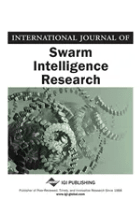
International Journal of Swarm Intelligence Research
Scope & Guideline
Exploring the Frontiers of Swarm Intelligence
Introduction
Aims and Scopes
- Swarm Intelligence Algorithms:
The journal focuses on the development and refinement of swarm intelligence algorithms such as Particle Swarm Optimization (PSO), Ant Colony Optimization, and more, emphasizing their theoretical foundations and practical implementations. - Applications in Real-World Problems:
Research is directed towards applying swarm intelligence techniques to solve complex real-world problems, including optimization in engineering, healthcare, and environmental management. - Hybrid Approaches:
The journal encourages studies that combine swarm intelligence with other computational techniques, such as deep learning and genetic algorithms, to enhance performance and applicability. - Interdisciplinary Research:
The journal promotes interdisciplinary research that integrates swarm intelligence with fields like IoT, cloud computing, and robotics, showcasing the versatility and impact of swarm techniques in diverse areas. - Performance Analysis and Optimization:
There is a consistent focus on the performance analysis, convergence, and optimization of swarm algorithms, providing insights into their efficiency and effectiveness in various scenarios.
Trending and Emerging
- Integration with Deep Learning:
The intersection of swarm intelligence with deep learning methodologies is gaining traction, as researchers explore how these combined approaches can enhance machine learning models, particularly in areas like image recognition and natural language processing. - IoT and Smart Systems:
There is a marked increase in research focused on applying swarm intelligence to the Internet of Things (IoT), emphasizing the design of intelligent systems that can optimize resource management and decision-making in interconnected environments. - Multi-Objective Optimization:
Papers addressing multi-objective optimization problems are on the rise, reflecting a growing interest in developing algorithms that can simultaneously optimize several conflicting objectives, particularly in engineering and resource allocation. - Healthcare Applications:
The application of swarm intelligence in healthcare, particularly in predictive modeling and medical image analysis, is emerging as a significant theme, highlighting the potential of these algorithms to improve patient outcomes and operational efficiency. - Energy Management and Sustainability:
Research focusing on the application of swarm intelligence for energy management and sustainable practices is increasingly prominent, indicating a response to global environmental challenges and the push for smarter energy solutions.
Declining or Waning
- Traditional Optimization Techniques:
There has been a noticeable decline in papers focusing exclusively on traditional optimization techniques without the integration of swarm intelligence, suggesting a shift towards more hybrid and innovative approaches. - Basic Theoretical Studies:
Research that solely revolves around the theoretical aspects of swarm intelligence algorithms without practical applications is becoming less frequent, as the emphasis shifts towards applied research. - Single-Domain Applications:
The exploration of swarm intelligence in specific domains, such as finance or agriculture, appears to be waning, indicating a broader trend towards multidisciplinary applications. - Static Problem Solving:
There is a decreasing focus on static optimization problems, as researchers increasingly address dynamic and real-time challenges, reflecting the need for more adaptable and responsive algorithms.
Similar Journals

Progress in Artificial Intelligence
Unveiling the Future of Artificial IntelligenceProgress in Artificial Intelligence is a leading journal published by SpringerNature, dedicated to advancing knowledge and research in the field of artificial intelligence. With a strong emphasis on the latest developments from 2012 through 2024, this journal enjoys a prominent position, holding a Q2 ranking in the prestigious Artificial Intelligence category for 2023, as well as achieving an impressive ranking of 64 out of 350 in the Computer Science - Artificial Intelligence category on Scopus, placing it in the 81st percentile. Progress in Artificial Intelligence serves as an essential platform for researchers, professionals, and students seeking to share innovative algorithms, applications, and theoretical advancements. Although it operates under a subscription model, its commitment to disseminating high-quality research and fostering collaboration in the AI community significantly contributes to the ongoing evolution of this exciting discipline.

Natural Computing
Unlocking Nature's Secrets for Computational AdvancementNatural Computing is a leading peer-reviewed journal published by Springer, focusing on the interdisciplinary study of natural computation methods and their applications across various domains. With an ISSN of 1567-7818 and an E-ISSN of 1572-9796, this journal has established itself as vital in the field of Computer Science Applications, as reflected in its esteemed Q2 quartile ranking and a Scopus rank of #358 among 817 journals, placing it in the 56th percentile. Based in the Netherlands, Natural Computing covers a diverse range of topics, including computational models inspired by natural systems, evolutionary algorithms, and swarm intelligence. Seeking to bridge the gap between theoretical research and practical applications, this journal serves researchers, professionals, and students by providing insights and advancements in the field. With a commitment to fostering innovation, Natural Computing aims to push the boundaries of understanding in computational methods inspired by nature, making it an essential resource for those looking to contribute to and stay updated within this dynamic area.
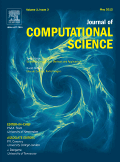
Journal of Computational Science
Fostering Interdisciplinary Dialogue in Computational ResearchThe Journal of Computational Science, published by Elsevier, is a premier academic journal that serves as a vital platform for researchers and professionals in the fields of computer science, modeling, and simulation. With an ISSN of 1877-7503 and an E-ISSN of 1877-7511, this journal focuses on the latest advances in computational methodologies and their applications, fostering interdisciplinary dialogue and collaboration. As of 2023, it holds an impressive Q2 ranking in multiple categories, including Computer Science (miscellaneous), Modeling and Simulation, and Theoretical Computer Science, showcasing its relevance and impact within the scholarly community. The journal features comprehensive research articles, reviews, and case studies that contribute significantly to the understanding and development of computational techniques. With its high standing in Scopus rankings, including a 79th percentile ranking in Mathematics - Modeling and Simulation, the Journal of Computational Science is an essential resource for anyone seeking to advance their knowledge and research in this dynamic field.

Memetic Computing
Advancing the Frontiers of Computational InnovationMemetic Computing is a premier academic journal published by SPRINGER HEIDELBERG, dedicated to advancing research in the interdisciplinary domains of computer science and control optimization. With an impact factor that places it in the prestigious Q1 category for both Computer Science and Control and Optimization as of 2023, Memetic Computing stands at the forefront of innovation, offering researchers, professionals, and students a vital platform to explore and disseminate transformative findings in these rapidly evolving fields. With convergence periods specified from 2009 to 2024, the journal aims to illustrate the synergy between algorithmic and natural systems, reflecting current trends and future trajectories within the scope of memetic algorithms. Its robust Scopus rankings signal its significance as an influential resource within the global academic community. This journal is invaluable for those looking to enhance their understanding and engage with cutting-edge research that blends computational theory with practical applications.
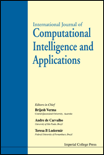
International Journal of Computational Intelligence and Applications
Advancing the Frontier of Computational IntelligenceThe International Journal of Computational Intelligence and Applications, published by WORLD SCIENTIFIC PUBL CO PTE LTD, is a prominent journal dedicated to advancing the field of computational intelligence and its applications, with a keen focus on innovative methodologies and theoretical frameworks. With an impact factor reflective of its growing influence, the journal is classified in Q3 for Computer Science Applications and holds Q4 standings in both Software and Theoretical Computer Science as of 2023, showcasing its critical niche within these disciplines. Established in 2008 and converging through 2024, this journal serves as a vital resource for researchers, professionals, and students in Singapore and beyond, promoting scholarly communication and collaboration. Although it is a non-open access journal, it still provides a wealth of information that is readily accessible through institutional subscriptions and library resources. Researchers contributing to the journal benefit from its wide reach and dedicated readership, making it a substantial platform to disseminate groundbreaking research and insights.
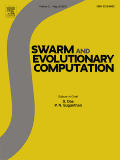
Swarm and Evolutionary Computation
Transforming Complex Challenges into Opportunities.Swarm and Evolutionary Computation is an esteemed academic journal published by Elsevier, dedicated to the exploration of innovative algorithms and methodologies derived from principles of swarm intelligence and evolutionary computation. With its ISSN 2210-6502 and E-ISSN 2210-6510, this journal has earned a prominent position in the field, evidenced by its Q1 category rankings in both Computer Science and Mathematics for 2023, reflecting its high impact and relevance. The journal's Scopus rankings further underscore its significance, placing it in the top percentile of mathematics and computer science journals. As an open-access platform, it aims to disseminate groundbreaking research that addresses real-world challenges and fosters interdisciplinary collaboration. Researchers, professionals, and students are encouraged to engage with this journal to contribute to and benefit from the ongoing advancements in swarm intelligence and evolutionary methods, which have become instrumental in solving complex optimization problems across diverse fields.

Swarm Intelligence
Advancing Knowledge in Collective Intelligence SystemsSwarm Intelligence, published by Springer, is a leading academic journal dedicated to the interdisciplinary field of artificial intelligence, with a strong focus on the principles and applications of swarm intelligence. Since its inception in 2008, the journal has encompassed innovative research contributions that explore complex adaptive systems modeled after the collective behavior of social organisms. Operating within the Q2 category of artificial intelligence, according to the 2023 category quartiles, this journal has attained a respectable Scopus rank of 141 out of 350, placing it in the 59th percentile of its field. Researchers and professionals benefit from a platform that fosters high-quality scholarly dialogue and develops theoretical frameworks essential for understanding collective intelligence mechanisms. With no open access option currently available, readers can find this journal in esteemed libraries and university repositories, ensuring that cutting-edge research continues to permeate through the academic community and beyond.
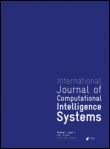
International Journal of Computational Intelligence Systems
Advancing Knowledge in Computational IntelligenceInternational Journal of Computational Intelligence Systems, published by SPRINGERNATURE, is a leading open-access journal that has been at the forefront of research in the field of computational intelligence since 2008. With an ISSN of 1875-6891 and an E-ISSN of 1875-6883, this journal occupies a prominent place in the academic landscape, achieving impressive rankings in its categories: Q2 in both Computational Mathematics and Computer Science (miscellaneous), reflecting its significance and relevance to researchers, professionals, and students. Based in Switzerland, the journal is committed to disseminating high-quality research and fostering innovation in computational methodologies, algorithms, and applications. Its strong impact factor and Scopus rankings—31/189 in Computational Mathematics and 53/232 in General Computer Science—underscore its critical role in advancing knowledge in these interdisciplinary fields. As an open-access journal, it provides unparalleled accessibility to cutting-edge research, supporting the global community in staying at the forefront of computational intelligence advancements.

ADVANCED ROBOTICS
Connecting Ideas in Robotics and EngineeringADVANCED ROBOTICS is a premier journal published by Taylor & Francis Ltd that has been at the forefront of robotics research since its inception in 1986. With an esteemed ISSN of 0169-1864 and E-ISSN of 1568-5535, this journal offers a unique platform for disseminating high-quality research across diverse domains within the robotics field, encompassing applications in Computer Science, Control and Systems Engineering, Hardware and Architecture. Ranked in the Q2 quartile across multiple categories in 2023, ADVANCED ROBOTICS maintains a reputable standing in the academic community, emphasizing its commitment to advancing knowledge and innovation. Although not an Open Access publication, the journal’s access options ensure that subscribers can explore the latest findings and engage with prominent experts in the field, facilitating an enriching exchange of ideas. Researchers, professionals, and students alike will find ADVANCED ROBOTICS an invaluable resource for keeping abreast of developments and contributing to the ever-evolving landscape of robotics.

Evolutionary Intelligence
Unraveling Complexities in Cognitive and Computational RealmsEvolutionary Intelligence is a prestigious journal published by Springer Heidelberg, dedicated to the interdisciplinary study of Artificial Intelligence, Cognitive Neuroscience, Computer Vision, and Mathematics. With its ISSN 1864-5909 and E-ISSN 1864-5917, the journal has established a significant presence in the academic community since its inception in 2008. Spanning a diverse range of topics relevant to both theoretical and empirical research, it has achieved impressive rankings, including Q3 in Artificial Intelligence and Cognitive Neuroscience, and Q2 in Computer Vision and Pattern Recognition as of 2023. With a strong Scopus ranking that places it in the top quartiles of its field, Evolutionary Intelligence serves as an essential platform for scholars and practitioners seeking to advance knowledge and foster innovation in these dynamic fields. Researchers, professionals, and students alike will find invaluable insights and cutting-edge findings that challenge existing paradigms and inspire future explorations in intelligence-related studies.